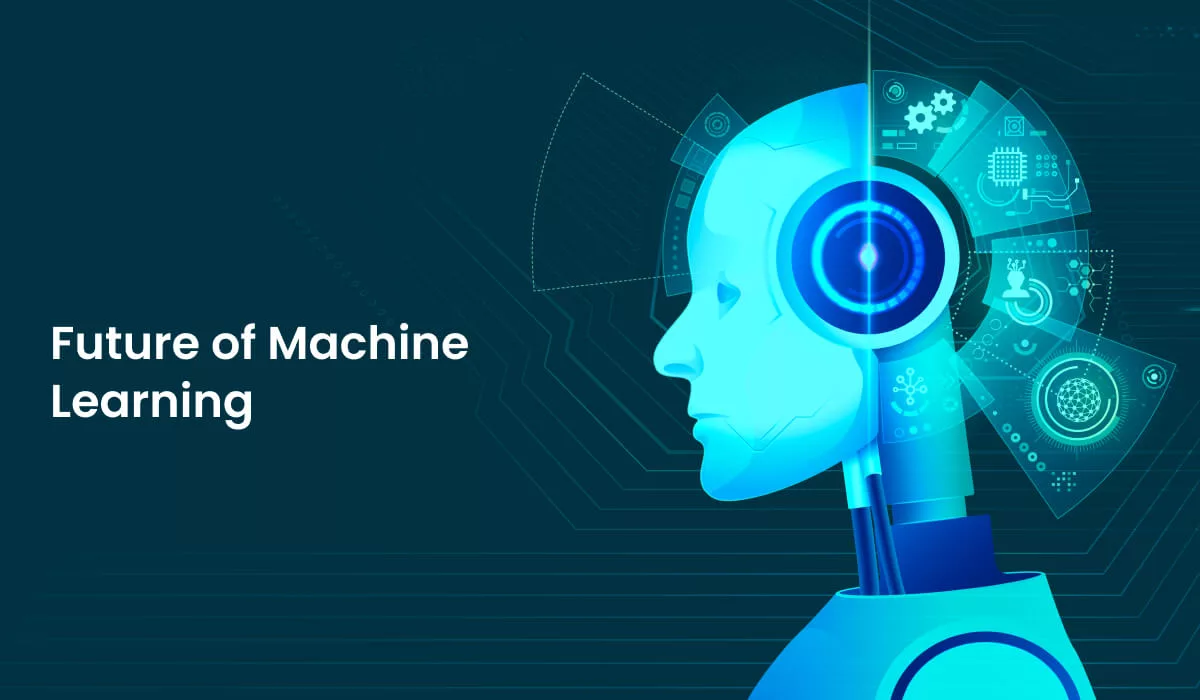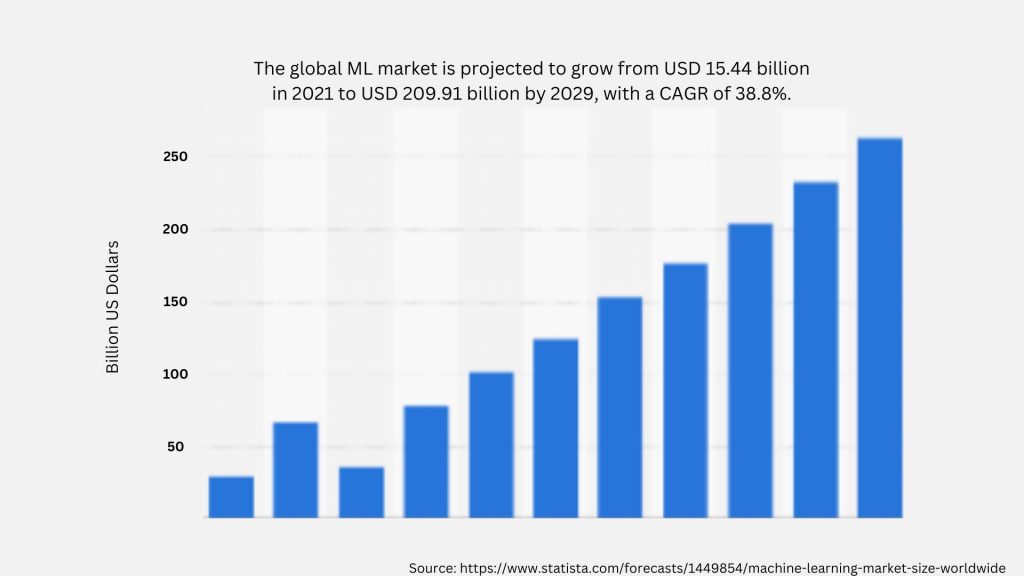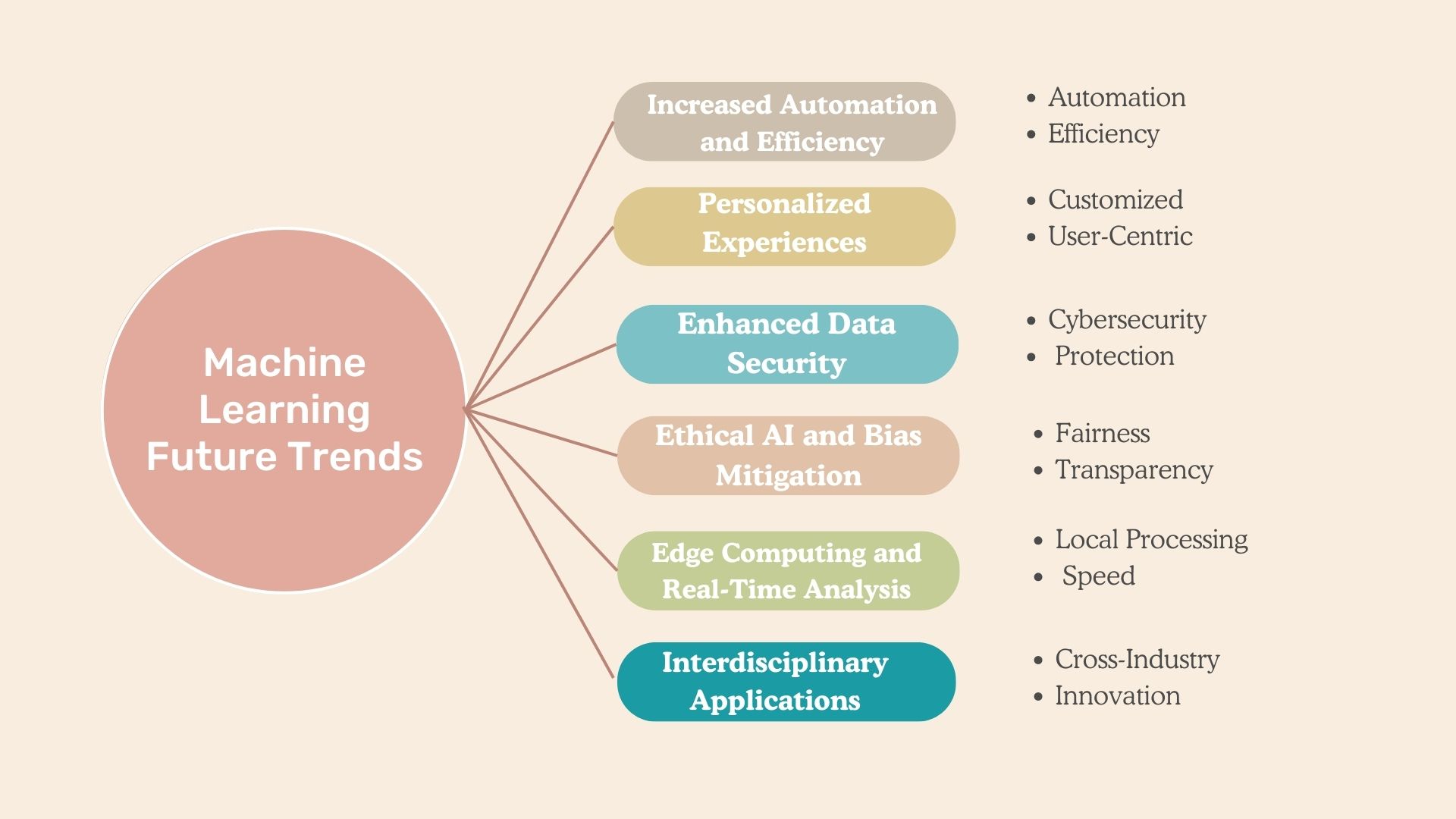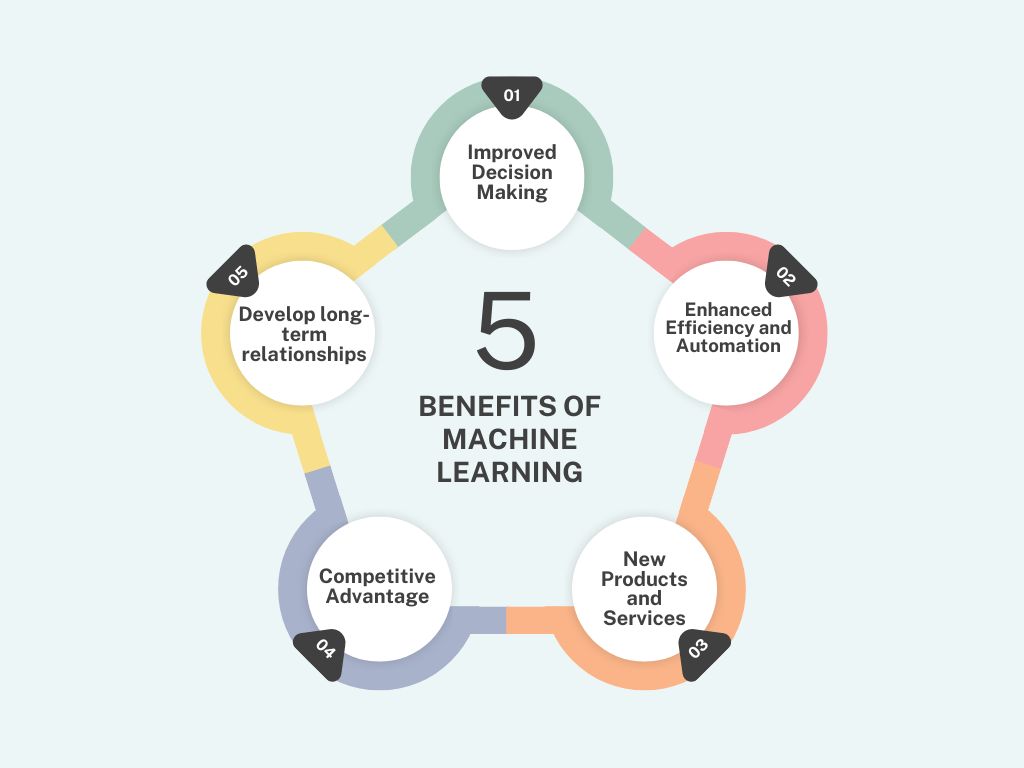
The Future of Machine Learning and Its Emerging Trends

In today’s fast-paced tech-driven world, machine learning (ML) stands out as a true game-changer, revolutionizing how we interact with technology and shaping our everyday lives in ways we could hardly have imagined a decade ago. At its core, ML empowers machines to learn and improve from data, creating endless possibilities for innovation and transformation.
One standout example is the evolution of the Natural Language API, revolutionizing communication between humans and machines while paving the way for an exciting future.
The future of machine learning is undeniably exciting. Analysts project explosive growth in the global ML market, which is expected to soar from $15.44 billion in 2021 to a staggering $209.91 billion by 2029, driven by an impressive compound annual growth rate (CAGR) of 38.8%. These numbers aren’t just statistics—they’re a testament to the immense potential ML holds for industries worldwide.

This boom is fueled by massive investments. By 2025, global funding for AI and ML is set to surpass $110 billion annually. Businesses across sectors are catching on, with nearly half already leveraging AI to innovate and streamline their operations. While automation might shift traditional job roles, it’s also creating incredible opportunities, with 97 million new jobs predicted to emerge by 2025, even as 85 million might be redefined or displaced.
Healthcare is one industry where ML is making a tangible difference. With its ability to enhance efficiency and personalize care, ML could save the sector up to $150 billion annually by 2026. These advancements highlight the profound ways technology can improve lives.
Want to see more examples of how ML is reshaping industries? Check out our related article on The Role of AI in Financial Services for deeper insights.
Machine Learning Explained
Machine Learning is a powerful branch of Artificial Intelligence (AI) that allows systems to learn from data, adapt, and improve over time—without needing to be explicitly programmed for every task. By identifying patterns, predicting outcomes, and automating repetitive processes, machine learning has become a game-changer for solving complex problems and driving innovation across countless industries.
In simple terms, it’s like teaching a computer to think, analyze, and make decisions—helping businesses work smarter and more efficiently.
The Evolution of Machine Learning (ML)
Machine learning’s journey started decades ago with early ideas around artificial intelligence (AI) and pattern recognition. As computational power grew and data exploded, ML made its way from research labs into the core of industry innovation. Here’s a quick look at its evolution:
- The Early Years: Neural networks and algorithms that could learn from data were in their experimental phase.
- The Renaissance: With deep learning, better computational power, and massive datasets, ML made a major comeback, unlocking new opportunities.
- The Present: ML is now a key player in everything from voice assistants on smartphones to recommendation systems on streaming platforms.
This journey has been about creating machines that can think, learn, and solve complex problems—and the best is yet to come.
Why Is Machine Learning So Important Today?
We need Machine Learning because it helps businesses and individuals make smarter decisions, automate tasks, and extract valuable insights from massive amounts of data. By recognizing patterns and trends, machine learning models can predict outcomes, optimize operations, and improve customer experiences with impressive accuracy.
Machine Learning (ML) takes care of repetitive tasks, reducing the chances of human error while boosting efficiency. As industries continue to generate vast amounts of data, ML becomes crucial for staying ahead of the competition, sparking innovation, and solving complex challenges in areas like healthcare, finance, marketing, and supply chain management.
And the future? It’s bright. With each passing day, machine learning is set to drive even bigger breakthroughs, with the potential to revolutionize industries and improve lives in ways we’ve only just begun to explore.
How the Future of Machine Learning is Defining the Technology
The future of machine learning looks incredibly exciting, and it holds potential that could stretch beyond what we can even imagine. As ML continues to evolve, here are some key areas where it’s expected to make a huge impact –
Transforming Industries
From healthcare to finance, Machine Learning Development is set to transform industries by making processes more efficient, offering personalized services, and sparking breakthrough innovations. In healthcare, for instance, ML algorithms can sift through massive amounts of medical data, helping detect diseases early, create personalized treatment plans, and even speed up drug discovery. In finance, ML is helping to spot fraud, automate trading strategies, and even improve customer service through AI-powered chatbots.
Enhancing Daily Life
Machine learning will keep enhancing our everyday lives, making our interactions with AI technology feel more natural and personalized. Imagine smart homes that truly understand your preferences and routines, adjusting everything from the temperature to security without you having to lift a finger. Personal assistants powered by ML will not just respond to commands, but anticipate your needs, offering relevant info and recommendations just when you need them.
Advancing Scientific Discovery
Machine learning has the power to process and analyze massive amounts of data, speeding up scientific research and unlocking new discoveries. In climate science, for example, ML algorithms can help predict climate patterns and extreme weather events with greater accuracy. Similarly, in astrophysics, ML is being used to analyze telescope data, helping scientists find new celestial bodies and uncover fascinating phenomena.
Ethical Considerations and Challenges
As machine learning keeps advancing, it brings with it important ethical questions and challenges. Tackling issues like data privacy, algorithmic bias, and job displacement due to automation will be key to creating a fairer and more ethical future. It’s essential that we develop and use ML technologies in a way that’s transparent, equitable, and aligned with ethical standards—only then can we truly unlock their full potential.
Enhanced Data Privacy and Security
With growing concerns around data privacy, secure machine learning practices like federated learning are gaining traction. These methods keep sensitive data safe by processing it locally and sharing only summarized insights with central systems—ensuring both privacy and efficiency.
Looking ahead, the future of machine learning promises transformative changes across industries. From revolutionizing business operations to enhancing customer experiences and driving societal progress, ML is set to redefine how we work and live. For organizations, staying in sync with these trends won’t just be an option—it’ll be essential for gaining a competitive edge in a rapidly evolving landscape.
Enhanced Data Privacy and Security
As data privacy concerns rise, secure ML practices, such as federated learning, are emerging. These approaches ensure data security by processing information locally and sending only aggregate data to central systems.
The Future of Machine Learning is poised to bring transformative benefits across sectors, driving innovations that will reshape business operations, consumer experiences, and societal progress. Staying aligned with these trends will be key for organizations aiming to leverage ML for a competitive edge.
Machine Learning Trends for the Future

Machine learning is advancing at an incredible pace, with future trends pointing towards smarter algorithms, seamless automation, and improved explainability. We’ll also see a stronger focus on ethical AI and tighter integration with other cutting-edge technologies. These advancements are set to amplify ML’s impact, transforming both industries and our everyday lives in ways we’re only beginning to imagine.
Increased Automation and Efficiency
As machine learning algorithms grow smarter, industries will see a rise in automation, with machines handling tasks like data analysis, pattern recognition, and decision-making. This shift will boost efficiency and cut costs, allowing humans to focus on more creative and strategic work. The result? Smarter workflows and innovative solutions across the board.
Personalized Experience
One of the most exciting aspects of machine learning is its power to deliver highly personalized experiences. From tailored e-commerce recommendations to customized healthcare treatments, ML analyzes vast data to meet individual needs. This trend will only grow as companies continue to enhance user experiences through smarter data use.
Enhanced Data Security
With data security becoming more critical than ever, machine learning is stepping up to detect and prevent cyber threats by spotting unusual patterns and behaviors. Future advancements will focus on creating smarter algorithms to protect sensitive information. The result? Stronger, more reliable digital security for everyone.
Ethical AI and Bias Mitigation
As machine learning becomes more widespread, its ethical implications—like algorithmic bias, fairness, and transparency—are taking center stage. Future trends will focus on building frameworks and regulations to ensure fairness and accountability. The goal? To create trustworthy AI systems that benefit everyone.
Edge Computing and Real-Time Analysis
The rise of IoT and the demand for real-time data processing are fueling the growth of edge computing. By analyzing data closer to the source, it reduces latency and boosts efficiency. With machine learning models deployed at the edge, real-time decisions in areas like autonomous vehicles and industrial automation are becoming a reality.
Interdisciplinary Applications
Machine learning is making waves across fields like genomics, agriculture, environmental science, and social sciences. Its interdisciplinary approach fosters collaboration, driving innovative solutions to complex problems. The result? Smarter insights and real-world impact across industries.
Robust Natural Language Processing
Advancements in natural language processing (NLP) are paving the way for smarter chatbots, virtual assistants, and language translation tools. These technologies are breaking down language barriers and transforming how we communicate globally, making interactions smoother and more natural than ever before.
Supply Chain Management
Predictive algorithms use historical data to forecast demand, helping businesses optimize inventory and reduce waste. Meanwhile, machine learning monitors purchases, shipments, and operations, flagging potential issues early. The result? Smarter supply chains and smoother workflows.
What Industries Will ML Impact the Most?
Machine Learning (ML) is quickly becoming a game-changer across industries, driving efficiency, innovation, and opening up new growth opportunities. Some industries, in particular, are seeing the most significant changes due to their reliance on data, operational efficiencies, and the need for innovation. Here’s a closer look at how ML is making an impact –
-
Healthcare
ML is improving diagnostic accuracy, personalizing treatments, and enhancing patient care. Algorithms can detect diseases early, analyze medical images, and even recommend tailored treatments. Hospitals also benefit from streamlined operations, improving outcomes and efficiency.
-
Financial Services
From detecting fraud to personalizing financial advice, ML is revolutionizing finance. It analyzes transaction patterns, helps manage risks, and enables smarter trading strategies, providing clients with more personalized investment insights.
-
Manufacturing
ML is driving the shift to smart factories, where predictive maintenance and quality control are automated. It helps prevent equipment failures, reduces downtime, and optimizes production for better efficiency and quality.
-
Transportation and Logistics
ML is enhancing transportation safety and efficiency through smarter route planning, predictive maintenance, and even autonomous vehicles. In logistics, it helps optimize inventory, forecast demand, and streamline delivery routes.
-
Retail and E-Commerce
ML is personalizing the shopping experience, from product recommendations to targeted marketing. It also optimizes inventory and supply chain management, making it easier for retailers to meet customer needs and reduce operational costs.
-
Agriculture
Precision farming powered by ML helps farmers increase yields and use resources more efficiently. ML analyzes satellite data and sensors to offer planting, watering, and harvesting recommendations, driving sustainability and better productivity.
-
Energy
ML is optimizing power distribution and consumption, forecasting demand, and integrating renewable sources for more sustainable energy systems. It also plays a key role in predictive maintenance, ensuring energy infrastructure runs smoothly.
-
Education
ML is transforming learning with personalized educational experiences and automating administrative tasks. It adapts content to students’ learning styles and speeds, while also freeing up educators to focus on teaching rather than paperwork.
-
Entertainment and Media
In entertainment, ML tailors content recommendations to individual tastes, enhancing user experiences. It’s also revolutionizing content creation, helping generate new music, art, and literature, reshaping how we consume and create media.
-
Cybersecurity
ML is improving cybersecurity by spotting and responding to threats in real time. By analyzing data traffic patterns, it detects anomalies that might signal a cyberattack, enabling faster reactions to potential breaches.
How Can You Get the Benefits of Machine Learning?
Embracing machine learning (ML) brings real, measurable benefits to businesses and everyday life. By understanding and tapping into the power of ML, you can unlock new efficiencies, uncover valuable insights, and seize opportunities that were once out of reach.

-
Better Decision Making
ML algorithms dive deep into data to spot trends, patterns, and anomalies, helping businesses make smarter decisions. This could mean more accurate market predictions, better product strategies, and smoother operations.
-
Boosted Efficiency and Automation
ML takes care of repetitive tasks, freeing up humans to focus on more creative and complex work. From automating routine activities to handling financial analysis and even self-driving cars, ML is all about ramping up efficiency.
-
Personalization at Scale
ML is great at understanding what people want, enabling businesses to deliver personalized experiences at a large scale. Whether it’s custom marketing, product recommendations, or tailored content, ML makes it easier to delight customers and build loyalty.
-
New Products and Services
ML is behind some of the coolest new innovations. Think AI-driven health apps that suggest fitness plans, or personal assistants that anticipate your needs and offer helpful services—ML opens the door to endless possibilities.
-
Staying Ahead of the Competition
Companies that adopt ML are already one step ahead. By optimizing operations, creating personalized experiences, and launching innovative products, ML helps businesses stand out and stay ahead in the competitive race.
Unlock the Future of Machine Learning!
Take advantage of transformative Machine Learning solutions that drive business success, improve efficiency, and unlock new opportunities for growth.
Conclusion
The future of machine learning isn’t just about new tech; it’s about how it will reshape our world. As ML continues to evolve, its influence on industries, everyday life, and even scientific breakthroughs will only grow. But to fully embrace this future, we need more than just innovation—we need to tackle the ethical issues that come along with it. Only then can we unlock ML’s potential to create a smarter, more inclusive, and fairer world for all.
FAQs
-
Is machine learning a good career for the future?
Yes, machine learning offers a promising career path. With its growing application across various industries, the demand for skilled professionals in machine learning is expected to rise significantly. Careers in this field can be highly rewarding due to the potential for innovation, impact, and financial compensation.
-
Is machine learning the next big thing?
Machine learning is already considered a major disruptor in the tech industry and beyond, shaping up to be a foundational element of the next wave of technological and economic transformation. Its ability to drive efficiency innovation, and solve complex problems makes it a key driver of future advancements.
-
How will AI and machine learning impact the future?
AI and machine learning will profoundly impact the future, transforming industries, creating new markets, and changing the way we live and work. They will automate tasks, enhance decision-making, personalize experiences, and enable breakthroughs in fields like healthcare, energy, and transportation.
-
Is machine learning future-proof?
While no career can be completely future-proof, machine learning is positioned well against future changes due to its central role in driving innovation and addressing complex challenges. The need for machine learning skills is expected to grow, making careers in this field resilient to automation and other shifts in the job market. Continuous learning and adaptation to new technologies will be key to staying relevant in this dynamic field.

About Author
Jayanti Katariya is the CEO of BigDataCentric, a leading provider of AI, machine learning, data science, and business intelligence solutions. With 18+ years of industry experience, he has been at the forefront of helping businesses unlock growth through data-driven insights. Passionate about developing creative technology solutions from a young age, he pursued an engineering degree to further this interest. Under his leadership, BigDataCentric delivers tailored AI and analytics solutions to optimize business processes. His expertise drives innovation in data science, enabling organizations to make smarter, data-backed decisions.
Table of Contents
Toggle